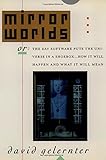https://www.amazon.com/Semiology-Graphics-Diagrams-Networks-...
https://medium.com/@karlsluis/before-tufte-there-was-bertin-...
Interestingly another relatively unknown book I like (and bought/read 20 years ago) is also about harmony:
https://www.amazon.com/Harmonic-Experience-Harmony-Natural-E...
I would say there's two kinds of harmony: harmony in equal temperament, and "alternative" harmonies based on physics, and this is about the latter. I can't tell from the link what the other harmony book is about. What's good about it?
As far as computer books, I've read a lot of recommendations here over the years like "thinking forth", "Computer Lib" by Ted Nelson, etc. They are well known to some audiences but not others.
----
I also enjoy reading what people though the computing future would be like. I have "Superdistribution" by Brad Cox:
https://news.ycombinator.com/item?id=21833331
And "Mirror Worlds" by Gelertner:
https://www.amazon.com/Mirror-Worlds-Software-Universe-Shoeb...
I'm pretty sure Gelertner claims that the Facebook feed is identical to his "life streams". I guess taken literally it's hard not to see the current Internet as a "mirror world" that's becoming the real world.
That's one of the things about tuple spaces[0,1,2] that was described in the book Mirror Worlds[3]. The author gives a lengthy description of a tuple's life. In practice, it really depended on what pattern you used to process the tuples.
0) https://software-carpentry.org/blog/2011/03/tuple-spaces-or-...
1) https://en.wikipedia.org/wiki/Tuple_space
2) http://wiki.c2.com/?TupleSpace
3) https://www.amazon.com/Mirror-Worlds-Software-Universe-Shoeb...
[0] https://github.com/robhawkes/vizicities
[1] http://www.amazon.com/Mirror-Worlds-Software-Universe-Shoebo...
http://en.wikipedia.org/wiki/Tuple_space
http://en.wikipedia.org/wiki/Linda_(coordination_language)
http://www.amazon.com/Mirror-Worlds-Software-Universe-Shoebo...


Review at https://www.rand.org/pubs/papers/P6083.html
Related explorations:
David Gelernter's "Mirror Worlds" (1993) https://www.amazon.com/Mirror-Worlds-Software-Universe-Shoeb...
Guidelines for policy modellers – 30 years on: New tricks or old dogs? (1971) https://mssanz.org.au/modsim2011/G6/syme.pdf
Group model building: problem structuring, policy simulation and decision support https://repository.ubn.ru.nl/bitstream/handle/2066/46184/461...